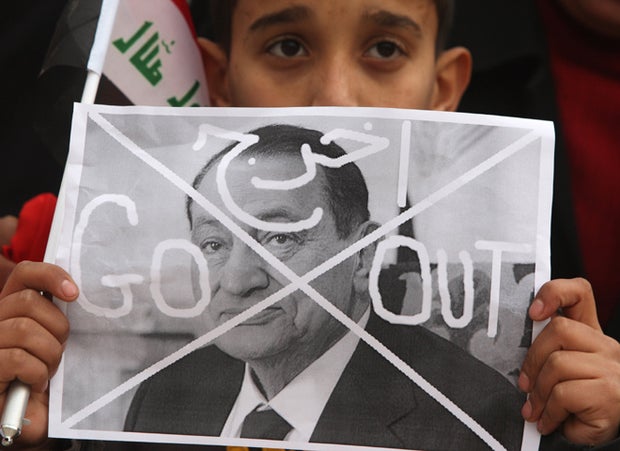World Leaders' (and Ex-Leaders') Messages to Mubarak
Public statements by world leaders so far in response to this week's unrest in Cairo and other cities across Egypt have urged the government of President Hosni Mubarak to show restraint against protesters, but only a few have dared speak of regime change as essential, or inevitable.
The White House has upped the pressure a bit on Mubarak, saying President Obama supports an "orderly transition" of government in Egypt, reports CBS News chief White House correspondent Bill Plante.
Secretary of State Hillary Clinton echoed the message on "Face the Nation" Sunday, telling Bob Schieffer, "What we are focused on now is a transition that will meet the needs of the Egyptian people and that will truly establish democracy."
But when pressed to say whether that means President Mubarak should go, Secretary Clinton wouldn't say. "I'm not speculating about, you know, who goes or who stays," she said.
Many other world leaders have been cautious in their public statements, given the fluid situation and lack of clarity about Mubarak's prospects of remaining in office - or the prospects of Egypt's future government should he be forced out.
European heads of states urged the Egyptian government to implement democratic reforms and avoid violence against protesters "at all costs." Their message: reform is required to bring stability back to the country and region.
French President Nicolas Sarkozy said, "Our conscience needs to be pricked by the cries of innocent victims and move us toward finding a workable solution to prevent further suffering."
Live Blog: Day Seven of Crisis in Egypt
Complete Coverage: Anger in the Arab World
British Prime Minster David Cameron condemned the recent violence, and through a spokesperson said the Egypt needed "a comprehensive process of political reform, with an orderly, Egyptian-led transition leading to a government that responded to the grievances of the Egyptian people."
Japan's foreign ministry issued a statement: "We hope that the government of Egypt will listen to the voices of many citizens, promote reforms in a way that gains support of a wide range of people and realize its stability and progress."
But some former leaders of governments - free from their elected offices - have been more pointed in their comments.
Former U.K. Prime Minister Tony Blair, now a Special Envoy to the Middle East, said that change is inevitable in Egypt. Or, as he put it to Reuters, "You cannot put the genie back in the bottle."
In an interview with BBC News, Blair advised caution, "because there are elements of people who want to see more modern, more democratic government. There are also elements, frankly, would exploit the situation and take it in an extreme direction. I think the important things is, however it's done, we manage it and manage that process of change in a way that allows these countries to be stable and the transition to happen in an orderly way."
When questioned about his use of the term "manage" - as in, who? - Blair alluded to the leaders with whom he has been dealing with to help bring peace to the Middle East.
"By the way, I've had a very good relationship with President Mubarak over the years," he said. But that doesn't mean he supports keeping the current regime as is.
"There's no doubt what is going on the Middle East as a whole - and it has been for years, and I've been saying his for years - there is a process of transition and the question is, where is it transiting to? And I hope and I believe that if it is managed properly it will transit to a better place economically, politically, socially for these countries."
Former U.S. President Jimmy Carter was much more blunt, saying Sunday that Mubarak has to go.
Speaking to a Sunday School class at Maranatha Baptist Church in Plains, Ga., Carter said the current crisis was "the most profound situation in the Middle East since I left office."
Chuck Williams of the Columbus (Ga.) Ledger-Enquirer reports that Carter called this week's protests and riots an "earth-shaking event."
Carter, who helped bring together the 1978 peace accord between Israel and Egypt, told the audience that he knows Mubarak (who was Anwar Sadat's vice president before Sadat's 1981 assassination) quite well. "If Sadat had a message, he would send Mubarak," Carter said.
Over the course of Mubarak's three decades in office, the Egyptian president has, in Carter's words, " become more politically corrupt.
"He has perpetuated himself in office," he said.
Carter said his belief is, "Mubarak will have to leave."
If Mubarak were to look to another country for support, he would have to go no further than Israel.
Haaretz reports that Israel - worried about its ally and neighbor becoming unstable - is calling on other countries to curtail criticism of the Mubarak regime.
Quoting an anonymous senior Israeli official, Haaretz reports that on Saturday the Foreign Ministry issued a directive to embassies in the U.S., Canada, China, Russia and throughout Europe, telling ambassadors to stress the importance of Egypt's stability to their host countries, and to do so as quickly as possible.
Prime Minister Benjamin Netanyahu also ordered members of his cabinet not to speak publicly on the Egypt crisis.
